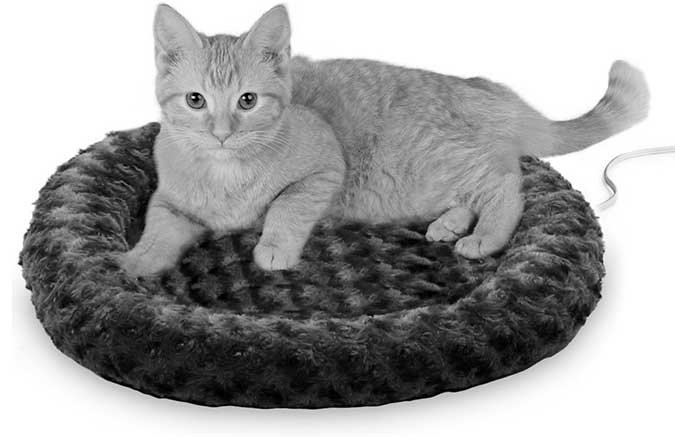With good care from loving owners, indoor cats can enjoy a great life, but when the temperature plummets, they can benefit from some extra TLC.
The most valuable advice from a specialist in emergency and critical care: “Come winter, the most important thing is to keep pets indoors where it’s warm,” says Elisa Mazzaferro, MS, DVM, Ph.D., ACECC, at Cornell University Veterinary Specials in Stamford, Conn.
Indoor cats can become uncomfortably cold in a drafty house, especially young kittens and seniors. If you set your thermostat lower at night and during work hours you need to know that, “Arthritic cats may feel stiffer and have difficulty walking then,” Dr. Mazzaferro says.
© K& H Pet Products

Warmth for Naps
Consider creating some warm napping places. Warm air rises, so move your cat’s bed off the cold floor, ideally to a semi-enclosed spot. If he likes to lounge on a favorite windowsill, draft-proof it and line it with a towel.
Many different heating pads for animals are available for cold-weather comfort. Some are electric or microwaveable. Others are thermal pads that capture the cat’s own body heat. Whatever you choose, make sure the pads won’t overheat — they can cause thermal burns, Dr. Mazzaferro says.
While you may keep litter boxes out of sight in basements and garages, these places can become chilly and damp. Relocate the litter box to a warmer spot, and you will be less likely to deal with unwanted outside-the-box behavior.
Potential Poison
Carbon monoxide, a colorless, odorless poison gas, is the No. 1 indoor winter hazard — a silent killer. It can be released from a dysfunctional furnace or heater. “Like people, cats are highly sensitive to carbon monoxide poisoning. Signs of carbon monoxide intoxication include stumbling, nausea, vomiting, lethargy and unconsciousness,” Dr. Mazzaferro says. “Know these signs, and have a working carbon monoxide detector and alarm in your home.”
Running the car in an attached garage while warming it or unloading groceries with your cat inside the house can also result in carbon monoxide poisoning. “Run your car outdoors, not in a garage, to prevent carbon monoxide from accumulating,” says Dr. Mazzaferro.
Cats love heat, but it can be too much of a good thing. “A good rule of thumb is that anything that would be too dangerous for a child, too hot to touch or any open flame might also pose a risk to your cat,” she says. “Old radiators can get too hot. If a cat jumps on them, they can cause burns. Space heaters can also topple over if jumped on. And rolling logs or flying sparks from a fireplace are equally dangerous. Use a fire screen to keep them at a safe distance.”
Candles can be hazardous, too. “Cats may want to play with the flickering flame,” Dr. Mazzaferro says. “They can singe their whiskers and get second- or third-degree burns on their paws. Candles also can be knocked over, and melted wax can also cause serious burns. And needless to say, knocked over candles can also start fires.” Battery-operated candles are a better option.
Stash Those Cords
Modern life is such that everyone has electric cords — more of them during the holidays. Run them through a PVC pipe, behind a couch or taped along a baseboard. “Anything that stops wires from dangling, such as clipping them to the wall, will make them much less appealing to your cat,” Dr. Mazzaferro says.
Otherwise, they can invite chewing, causing burns, electrocution and development of a severe syndrome known as noncardiogenic pulmonary edema, a buildup of fluid in the lungs that prevents them from absorbing oxygen. “This condition can be life threatening,” says Dr. Mazzaferro.
If your cat can access a basement or garage, store antifreeze, de-icers, cleaning fluids, pesticides and other chemicals out of reach. It’s not unusual for antifreeze to leak from cars or spill from loosely sealed containers. “It takes less than a teaspoon of antifreeze to intoxicate a cat. The minimal lethal dose for a cat is one-fourth teaspoon per kilogram (2.2 pounds) of weight,” Dr. Mazzaferro says.
Unfortunately, traditional antifreeze tastes sweet and can be enticing. Be sure to clean up spills or puddles immediately. If you think your cat has ingested any poison, immediately call his veterinarian.
Winter is cold and flu time for humans, “but both prescription and over-the counter medications — everything from acetaminophen to ibuprofen to naproxen to pseudoephedrine — can cause feline seizures, destruction of red blood cells, kidney failure and even death,” says Dr. Mazzaferro. “Keep your medicine cabinet closed, and ask your visitors to zip up their suitcases.”
When visitors come bearing holiday gifts, be sure to remove wrappings of yarn, string and curly ribbons. “They may be too enticing for a cat, and end up causing intestinal blockages if ingested,” Dr. Mazzaferro warns.



